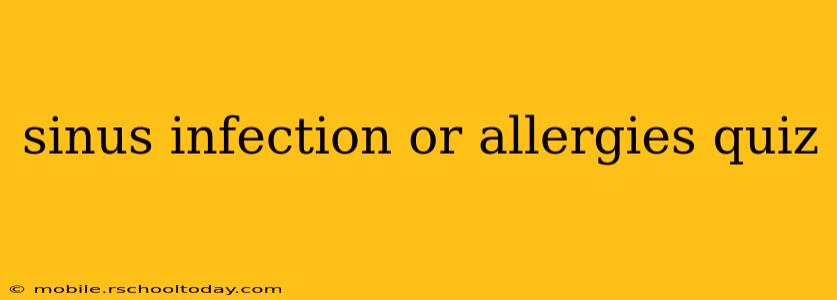Is it a sinus infection or allergies? That's a question many people ask themselves, especially during allergy season or when a cold lingers. The symptoms can often overlap, making self-diagnosis tricky. This quiz won't replace a doctor's visit, but it can help you pinpoint potential causes and guide you toward the right treatment.
Disclaimer: This quiz is for informational purposes only and does not constitute medical advice. Always consult a healthcare professional for diagnosis and treatment.
Let's start by answering a few simple questions:
1. How long have you been experiencing symptoms?
This is a crucial differentiating factor. Allergies tend to be more persistent, especially during allergy season, while sinus infections often have a more abrupt onset and a shorter duration (though some can be chronic).
2. What are your primary symptoms? (Check all that apply)
- Runny nose: Is your nasal discharge clear (allergies), thick and yellow/green (sinus infection), or both?
- Congestion: Is your nasal congestion severe, making it difficult to breathe?
- Facial pain/pressure: Do you feel pain or pressure in your forehead, cheeks, or around your eyes?
- Headache: Is your headache specifically related to sinus pressure?
- Cough: Is your cough dry or productive (with mucus)?
- Fever: Do you have a fever (temperature above 100.4°F or 38°C)?
- Fatigue: Are you experiencing unusual tiredness or lethargy?
- Itchy eyes/nose/throat: Do you have itchy eyes, nose, or throat?
- Sneezing: Are you experiencing frequent sneezing fits?
- Watery eyes: Are your eyes watery and irritated?
3. What are your known allergies?
Knowing your environmental allergies (pollen, dust mites, pet dander) can help determine the likelihood of an allergic reaction.
4. Have you been exposed to anyone with a cold or flu?
5. What is the character of your nasal discharge?
Is it thin and watery (allergies), thick and yellow/green (sinus infection), or a combination?
Interpreting Your Answers:
While this quiz can't definitively diagnose your condition, it can offer clues. Several factors point towards a sinus infection:
- Facial pain/pressure: This is a strong indicator of a sinus infection.
- Thick, yellow/green nasal discharge: This usually suggests an infection.
- Fever: Fever is more common with infections than allergies.
- Severe congestion: While allergies can cause congestion, it's often more pronounced in sinus infections.
Several factors point towards allergies:
- Itchy eyes, nose, and throat: This is a classic allergy symptom.
- Watery eyes and runny nose (clear discharge): These are typical allergy symptoms.
- Sneezing: Frequent sneezing is a hallmark of allergic reactions.
- Symptoms persist for a prolonged time: Allergies often last longer, especially during pollen season.
What to do next:
Regardless of your answers, it's crucial to consult a healthcare professional for a proper diagnosis and treatment plan. They can perform a physical exam, and potentially order tests to confirm whether you have a sinus infection, allergies, or another condition altogether. Self-treating can sometimes worsen your symptoms or mask a more serious problem. Early diagnosis and appropriate treatment are key to resolving your symptoms effectively.
Frequently Asked Questions (FAQs):
How is a sinus infection diagnosed?
A doctor will typically diagnose a sinus infection based on your symptoms and a physical exam. They may also use imaging tests (like X-rays or CT scans) in some cases.
How is an allergy diagnosed?
Allergy diagnosis often involves a thorough medical history review, physical exam, and allergy testing (skin prick test or blood test).
What's the difference between acute and chronic sinusitis?
Acute sinusitis lasts for less than four weeks, while chronic sinusitis persists for eight weeks or longer.
Can allergies cause a sinus infection?
Yes, prolonged inflammation from allergies can weaken the immune system of the nasal passages, making you more susceptible to sinus infections.
What are the treatment options for sinus infections?
Treatment usually includes saline nasal rinses, over-the-counter pain relievers, and in some cases, antibiotics.
What are the treatment options for allergies?
Treatment typically involves avoiding allergens, using antihistamines, decongestants, or nasal corticosteroids. Immunotherapy (allergy shots) may also be an option in certain cases.
Remember, this information is for general knowledge and shouldn't replace professional medical advice. Always consult your doctor or other qualified healthcare provider for any health concerns.
